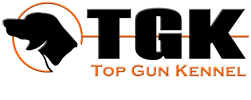Feeding Before and After a Hunt
Steve provides some tips on feeding and hydration before, during and after hunting your dog.
Steve provides some tips on feeding and hydration before, during and after hunting your dog.
As a breeder and trainer of canine athletes, we’ve spent many years refining our feeding program to ensure peak performance and condition throughout the year. Consequently, we get a lot of questions about the feeding regimen in our kennel. The following is a summary of some of the key points to consider regarding daily feeding requirements.
Before you consider how to feed, you must address the top priority. Dehydration is likely the greatest risk you face when moving from your off-season routine into the hunting season. While dogs don’t sweat, they lose water through a variety of other activities. The importance of a constant supply of clean, fresh water cannot be underestimated, and is likely the greatest contribution you can make to the health of your dog. Maintain a steady supply of water throughout the year and allow your dog to replenish with frequent small doses while hunting.
Puppies have 2-3 times the maintenance requirement of a similar sized adult. This makes it more difficult to meet their caloric needs as activity increases. We tell our customers that their puppy burns a lot of fuel but has a small tank. Consequently, we suggest feeding in small increments 3-4 times daily until at least six months of age to make sure energy needs are met. Since obesity can also cause major health issues down the road, we avoid overfeeding to consistently maintain ideal body condition.
Feeding an adult dog is easy during the off-season since there is little fluctuation in their requirements. A fifty pound dog can generally maintain proper body condition on 1000-1500 calories daily with normal temperatures and activity levels. As activity increases for the hunting season, calorie requirements can increase by as much as 50%. It is important to monitor your dog to make sure he maintains the proper condition to perform at the desired level throughout the season.
In our kennel, we place a great deal of importance on feeding times. Whatever the age of your dog, it is important to time feedings to allow for proper digestion before periods of activity. Here are a few quick feeding tips to help you avoid digestive issues with your dog.
It’s also important to train your dog to eat when offered. This will allow you to more easily adhere to the tips noted above and avoid problems while maximizing performance.
We’ll close with comments on how environmental factors affect calorie requirements. If your dog spends the winter in low temperatures, his body is forced to generate its own heat. He may need up to 30% more calories to generate the required body heat. If he’s curled up indoors with you, though, it’s best to avoid the extra calories and keep him lean and mean. This will make it easier to get him back into hunting form when the weather warms.
Steve & Jodie Ries
Top Gun Kennel
5825 31st Ave
Vinton, IA 52349
Phone: 319-350-4875
Email: sjries86@gmail.com
